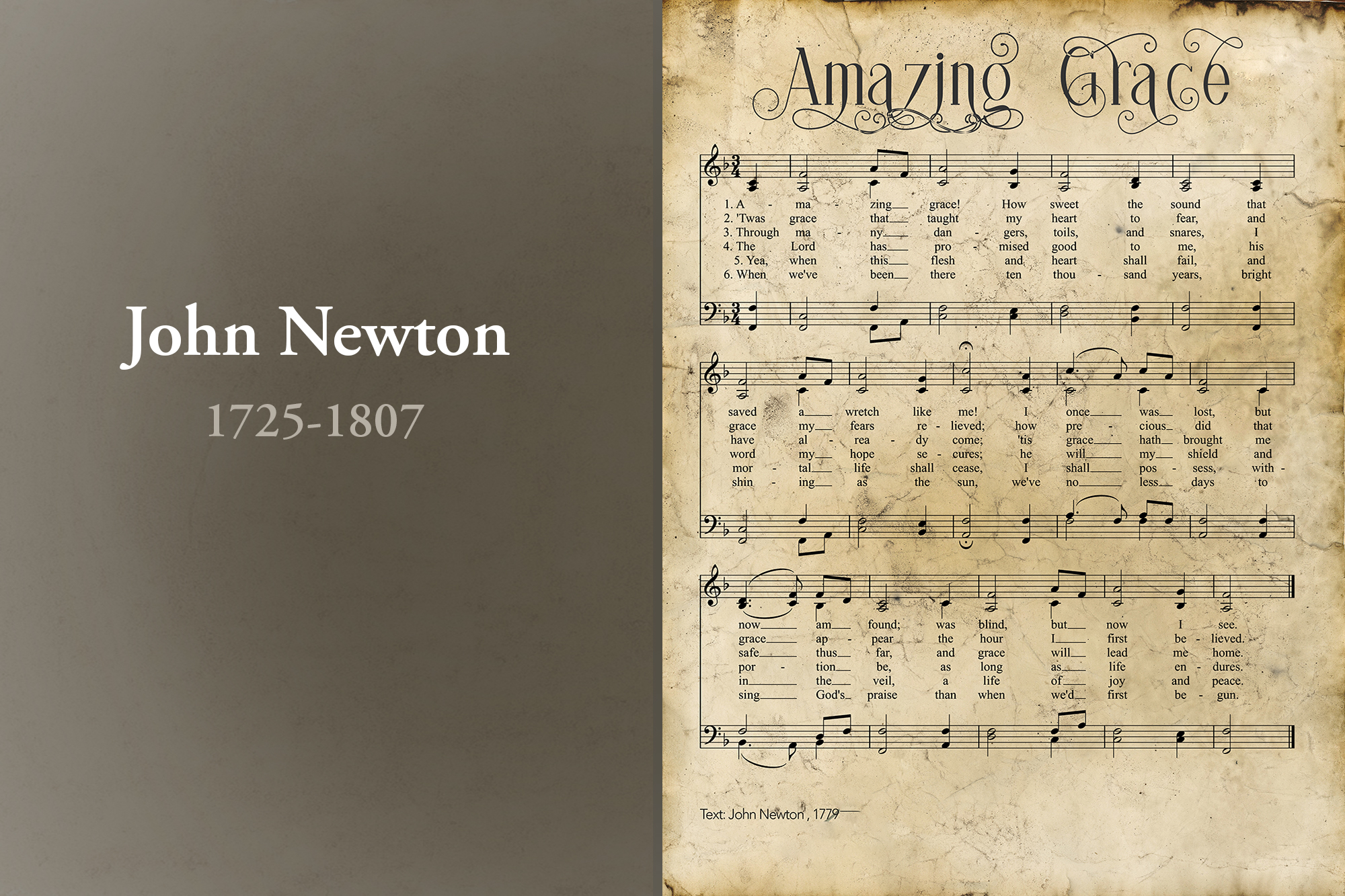[1]It was January 1, 1773. John Newton led his congregation down the road from the parish church in Olney, England, to Lord Dartmouth's Great Hall to sing "new" music not traditionally allowed by the Anglican Church. Newton loved to write hymns and poetry, and the hymn he wrote for this day was special. It spoke of his conversion, of his self- proclaimed wretchedness, and of the saving power of God's grace. Since then, the words of "Amazing Grace" have struck a chord with millions across cultures and generations, and its popularity has never wavered.
Six years later in 1779 "Amazing Grace" was first published in a hymn collection compiled by John Newton (1725-1807) entitled Olney Hymns. The familiar tune associated with "Amazing Grace" first appeared in the American tune book Virginia Harmony (1831), but did not include Newton's hymn. It was William Walker (1809-1875) who first joined together this tune with Newton's hymn in his tune book Southern Harmony (1835). Today, John Newton's words and this familiar tune are still being sung by Christians around the world.
Although the phrase "amazing grace" does not appear in the Bible, we are all familiar with the use of the word "grace" in scripture. Here are three familiar references:
John 1:14
And the Word became flesh and dwelt among us, and we have seen his glory, glory as of the only Son from the Father, full of grace and truth.
Acts 6:8
And Stephen, full of grace and power, was doing great wonders and signs among the people.
Ephesians 2:8 For by grace you have been saved through faith. And this is not your own doing; it is the gift of God,
The Ephesians verse reminds all of us that God's grace is amazing and we join with John Newton in singing:
Amazing grace! how sweet the sound
That saved a wretch like me!
I once was lost, but now am found,
Was blind, but now I see.
Of John Newton's original six stanzas printed in 1779, the first three stanzas remain as the most often sung by congregations today. The well-know and often added stanza beginning with the phrase "When we've been there ten thousand years" was not written by John Newton.[2] This stanza appeared "as the final stanza in a version of the anonymous hymn 'Jerusalem, my happy home' which appeared in numerous nineteenth-century American collections."[3] Here are the often omitted stanzas four, five, and six of Newton's original:
The Lord has promised good to me, His word my hope secures; He will my shield and portion be, As long as life endures. Yea, when this flesh and heart shall fail, And mortal life shall cease, I shall possess, within the veil, A life of joy and peace. The earth shall soon dissolve like snow, The sun forbear to shine; But God, who call'd me here below, Will be for ever mine.
In the recent years of the 21st century the personal testimony of Newton's words are being kept alive through two contemporary praise and worship songs: "Amazing Grace (My Chains Are Gone)" and "This Is Amazing Grace."
In 2006 Chris Tomlin released his See the Morning album which included an arrangement of Newton's hymn with an added bridge entitled "Amazing Grace (My Chains Are Gone)."[4] In 2008 Tomlin's arrangement of "Amazing Grace" was nominated for a GMA Dove Award and still remains today as a popular contemporary praise and worship song.[5] From Newton's original six stanzas, Tomlin included the familiar stanzas one and two and the lesser known stanzas four and six. The words of the bridge are an excellent summation of John Newton's life and the theology of his hymn "Amazing grace! how sweet the sound."
My chains are gone, I've been set free, My God, my Savior has ransomed me, And like a flood His mercy reigns, Unending love, Amazing grace.
It is significant to note that "amazing grace," the concluding phrase of Tomlin's bridge, is also the beginning phrase of Newton's hymn.
In 2013Phil Wickham released his The Ascension album which included the song "This Is Amazing Grace." This song does not include any of the stanzas from Newton's hymn, but including the phrase "amazing grace"[4] in the beginning line of the refrain immediately remind us of Newton's hymn.
This is amazing grace, This is unfailing love, That You would take my place, That You would bear my cross. You laid down Your life, That I would be set free. Oh, Jesus, I sing for All that You've done for me.In Wickman's own words:
The song is simply about the amazing grace and unfailing love that this God… this King of glory… this King above all Kings has shown to us…By taking our place on the cross, He bore our sin and went to the grave so that we may be set free, so that we may be forgiven.[4]
It is significant to note that both Tomlin and Wickham use the phrase "set free" in describing God's amazing grace.
John Newton's original hymn, Chris Tomlin's arrangement of the hymn, and Phil Wickham's newly composed song are all intended to be sung by Christians as they proclaim the Good News of God's amazing grace. Today we join together with Newton's 1772 congregation and sing:
Amazing grace! how sweet the sound That saved a wretch like me. I once was lost, but now am found, Was blind, but now I see.And we conclude by singing Wickham's words:
Oh, Jesus, I sing for All that You've done for me.Yes, let the singing continue; God's grace is amazing!
- [1] https://www.museumofthebible.org/magazine/exhibitions/celebrating-250-years-of-amazing-grace
- [2] William J. Reynolds, Companion to the Baptist Hymnal (Nashville: Broadman Press, 1976), 165.
- [3] Ibid
- [4] Chris Tomlin, John Newton, John P. Rees, Louie Giglio, worshiptogether.com songs, 2006.
- [5] https://www.cbn.com/cbnmusic/news/021508doves.aspx?mobile=false&q=cbnmusic/news/021508doves.aspx
- [6] Jeremy Rioddle, Josh Farro, Phil Wickman, Bethel Music, 2012
- [7] https://freeccm.com/2013/07/02/story-behind-the-song-this-is-amazing-grace-by-phil-wickham/


